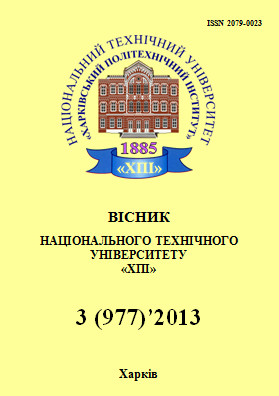Формирование участников логической сети цепочек поставок при стратегическом управлении
DOI:
https://doi.org/10.20998/%25xAbstract
Предлагается подход к формированию участников логистической цепи поставок при стратегическом управлении. В основу метода положен экспертный подход к оценке альтернатив. Разработана математическая модель для принятия решения.References
Годлевский М. Д. Технологии формирования системы организационного управления логистикой дистрибуции при стратегическом планировании / М. Д. Годлевкий, А. А. Станкевич, И. М. Годлевский // Восточно-европейский журнал передовых технологий – № 4/3. – 2012. – С. 17–21.
Крючковский В. В. Интроспективный анализ. Методы и средства экспертного оценивания: монография / В. В. Крючковский, Э. Г. Петров, Н. А. Соколова, В. Е. Ходаков. – Херсон. : Гринь Д. С., 2011. – 168 с.
Кобзарь А. И. Прикладная математическая статистика. Для инженеров и научных работников / А. И. Кобзарь. – М. : ФИЗМАТЛИТ, 2006. – 816 с.
Кэндел М. Ранговые кореляции / М. Кэндел. – М. : Статистика, 1975. – 196 с.
Downloads
Published
How to Cite
Issue
Section
License
Copyright (c) 2015 Вестник Национального технического университета "ХПИ". Серия: Системный анализ, управление и информационные технологииAuthors who publish with this journal agree to the following terms:
- Authors retain copyright and grant the journal right of first publication with the work simultaneously licensed under a Creative Commons Attribution License that allows others to share the work with an acknowledgement of the work's authorship and initial publication in this journal.
- Authors are able to enter into separate, additional contractual arrangements for the non-exclusive distribution of the journal's published version of the work (e.g., post it to an institutional repository or publish it in a book), with an acknowledgement of its initial publication in this journal.
- Authors are permitted and encouraged to post their work online (e.g., in institutional repositories or on their website) prior to and during the submission process, as it can lead to productive exchanges, as well as earlier and greater citation of published work (See The Effect of Open Access).

